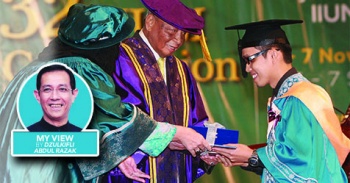A question of autonomy
Professor Tan Sri Dato' Dzulkifli Abdul Razak
My View - The Sun Daily
February 14, 2017

HE budget cut forced on several universities has thrust the issue of "autonomy" into the limelight again – albeit more focused on "financially autonomy".
Specifically universities are now "let loose" to generate their own income and supplement whatever shortfall they are facing. The overall situation is deemed dire by some including the former vice-chancellor of the nation's premier university who reportedly predicted that his former university will go "bankrupt".
This is vehemently denied by the university and the National Council of Professors (MPN) but depends very much on how "autonomy" is interpreted and dispensed.
"Autonomy" is a long-standing issue especially for public universities framed by the mindset: those who pay the piper call the tune!
To date the "tune" varies from the dubious autonomy model of "a camel entering a tent" to one based on a "reward" using a performance index dictated by the ministry. There are many more in between but they generally miss the point that "autonomy" is an ecosystem that is comprehensive and organically interrelated.
The Bologna Declaration, as an example, states: "The university is an autonomous institution at the heart of societies differently organised because of geography and historical heritage; it produces, examines, appraises and hands down culture by research and teaching. To meet the needs of the world around it, its research and teaching must be morally and intellectually independent of all political authority and economic power."
Whereas in Malaysia, the part on "morally and intellectually independent of all political authority and economic power" seems to be the thorniest barrier.
Our universities are intricately dependent on political and economic "power" so much so their being is a fair reflection of how (un)enlightened the powers that be are to create an ecosystem that is truly "autonomous".
In other words, the fate of the universities so far cannot be divorced from how the political and economic power is being exercised. After all properly understood, an "autonomous" university is one that is endowed with the right to determine its organisational and administrative composition, structure and governance; decide its priorities; seek and manage its budget; hire and reward and recognise its personnel; and admit its "choice" of students (not just the best and brightest); decide on the content and form of its teaching, research and consultancy as well as services to the community at large with minimal interference if at all. A tall order indeed as universities rightly belong to the rakyat, and are not a monopoly of the politics and economics of the day.
This is the core issue at stake. To quote MPN, if it is true that "the move to reduce allocations to public universities was planned some time back in a bid to reduce their dependence on the government for funding", the dependency syndrome was "encouraged" by the government when it rooted out the "autonomous" (independence) status of the university for its own political and economic interest based on the "piper's" axiom.
Thus far effort to earnestly develop an ecosystem for "autonomy" has been lackadaisical to say the least. As argued, financial autonomy alone cannot deliver without institutional autonomy and governance. The many examples that MPN cited to show otherwise relate to universities in other countries that are "autonomous" in the first place unlike their Malaysian counterparts.
MPN may well argue that universities will not go "bust" financially, but it cannot deny that academic standards will suffer greatly when experienced and internationally recognised academics cannot be retained. This creates academic gaps, if not a vacuum, that further threatens the quality of education. Or having to defer some programmes if not totally removing them to save cost.
The best practice is to hire during crisis time because there will be many candidates to choose from. And when things restabilise the institutions will be better endowed with new talent and passion.
The newly acquired talent and passion will in turn ensure that the universities continue to flourish in an even more autonomous ecosystem.
Unfortunately, Malaysian universities are "shaped" differently; unlike what the University of Malaya once was, and well respected globally. The powers that be then were much more enlightened as to what an autonomous university meant.
Today the diminishing state of autonomy reflects on how things have changed for the worse since the kind of "tune" being called for the piper to play is out of sync with the ethos of education and global norms.
It is not just the case of "the government not abandoning the universities" as claimed by MPN, but more about the government not leaving the universities alone, and empowering them with trust and accountability befitting an autonomous ecosystem.
Unless we have the courage to put this right the decline will continue. Universities will be convenient "scapegoats" when the responsibility should be directed squarely at those who insist on denying the "ecosystem" as a vital lifeline of an autonomous university.
In order to throw some light, IDEAS with financial support from Yayasan Sime Darby has independently taken the initiative to organise an in-depth research on university autonomy and will be hosting a roundtable discussion at Sime Darby Convention Centre on Feb 21-22.
The writer is chair in Higher Education at IDEAS
